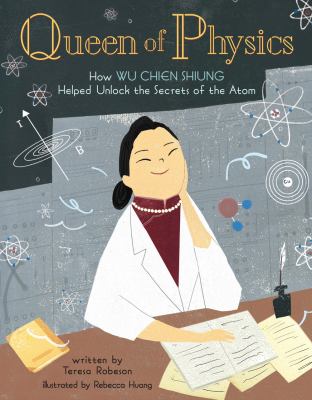
by Teresa Robeson
Book list To have a girl child in China at the turn of the last century was not considered fortunate for most families. But the Wu family was not like most, and Chien Shiung was not only encouraged to go to school (her parents were educators), she was told she could be whatever she wanted. That support was taken to heart, and Robeson details in short but informative bites of text how the young woman extended her education, moving ever further from home and finally to the U.S., where she would delve deeply into her passion, the study of atoms. Writing biographies about people from different times and cultures can have challenges, but trying to explain physics especially Wu's specialization, beta decay in a picture-book biography certainly ups the ante. Robeson surmounts these almost effortlessly, getting to the heart of Wu's professional life and simply detailing her many accomplishments, as well as informing her audience how Wu was slighted when it came to awards like the Nobel Prize, with male colleagues taking the honors. The text's accessibility is supported and enhanced by Huang's collage-style artwork that captures Wu's dedication and willingness to take on leadership roles both in the scientific community and in leading political protests in China. Wu Chien Shiung's story is remarkable and so is the way this book does it justice. A short biography and a dictionary of physics terms is appended.--Ilene Cooper Copyright 2010 Booklist From Booklist, Copyright © American Library Association. Used with permission. Publishers Weekly Robeson details the life of Wu Chien Shiung, a female physicist of the mid-20th century who completed important, often unrecognized work in beta decay. Fortunate to have parents who started a girls’ school in China, Wu was educated like her brothers, attended university, and led student protests to “resist Japanese invaders” just before WWII. After moving to the U.S., she investigates parity and beta decay in California and New York, often facing prejudice, and is passed over for the Nobel Prize as her male colleagues receive accolades. All the while, she perseveres, remembering her Baba’s words: “Just put your head down and/ keep walking forward.” Huang’s stylized illustrations feature chalkboards full of equations and backdrops with swirling nuclear symbols. A list of Wu’s “firsts” (first woman instructor at Princeton, for example) and a glossary of nuclear terms close this bittersweet biography of a brilliant woman. Ages 5–up. (Oct.) (c) Copyright PWxyz, LLC. All rights reserved Kirkus Societal limits cannot extinguish talent.When Wu Chien Shiung is born, her parents worry, "What would become of her?" Due to sexist mores, "in those days, girls were not sent to school." But Chien Shiung was lucky, as before she was born both parents had opened a school for girls, encouraging families in their town of Liuhe to educate their daughters. "Soon enough, Chien Shiung [has] learned everything she could from her parents' school," leaving for the city of Suzhou, miles away from home and family. There she finds her passions for physics, reading (or "self-learning"), and politics. Her extraordinary talent takes her to bigger opportunities and further away from home. Eventually she ends up at Columbia University in New York. Because of her expertise in beta decay, three groups of scientists enlist her help with their research. From her work, all three groups win the Nobel Prize, but she is overlooked every single time. And "because she [is] a woman, because she [is] Asian," Chien Shiung is passed over for jobs. Yet her advocacy and sheer talent cannot be ignored for much longer. Huang utilizes spirited mixed-media images with a neutral palette to illuminate Shiung's journey. Robeson is seemingly engrossed in the details, giving the longer-than-usual text the feel of a recitation of facts.The fascinating life of the subject compensates for a somewhat dry and lengthy narration. (Picture book/biography. 6-9) Copyright Kirkus Reviews, used with permission. Copyright © Kirkus Reviews, used with permission. |